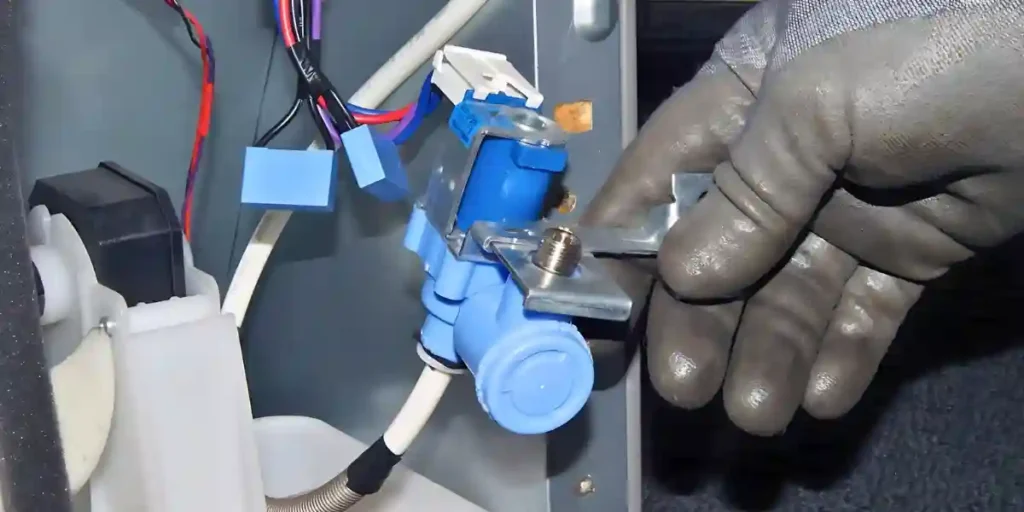Ever wondered how to turn off the water valve lurking behind it?
Join me on this epic plumbing quest as we navigate the hidden chambers, discover the valve’s power, and conquer any leaks that may come our way.
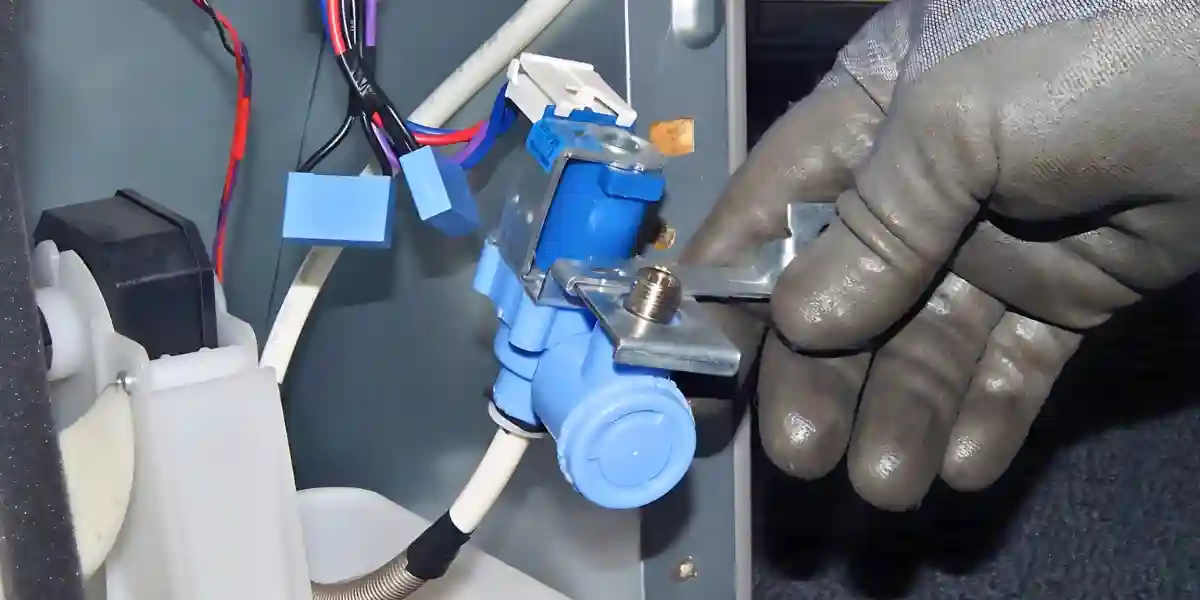
How To Turn Off Water Valve Behind Fridge?
Locate the valve behind or underneath the refrigerator near the water line. It’s a small, round, or oval-shaped valve with a handle.
Turn the handle clockwise to shut off the water. Check for leaks and tighten the valve if necessary.
Step-by-Step Guide: Turning Off the Water Valve
Locating the Water Valve Behind Your Fridge
To turn off the water valve behind your fridge, you first need to locate it. The water valve is typically found behind or underneath the refrigerator, close to the water line that connects to the fridge.
It may appear as a small valve, either round or oval-shaped, with a handle. Take a moment to examine the area behind your fridge and identify the valve’s position.
Turning Off the Water Valve
Now that you’ve located the water valve, it’s time to turn it off. To do this, grip the handle firmly and rotate it clockwise until it stops. This action shuts off the water supply to your fridge.
In some cases, you might need to use a wrench or pliers for a better grip, especially if the valve is difficult to turn by hand.
Take care not to apply excessive force, as it could damage the valve or the water line.
Checking for Leaks and Necessary Repairs
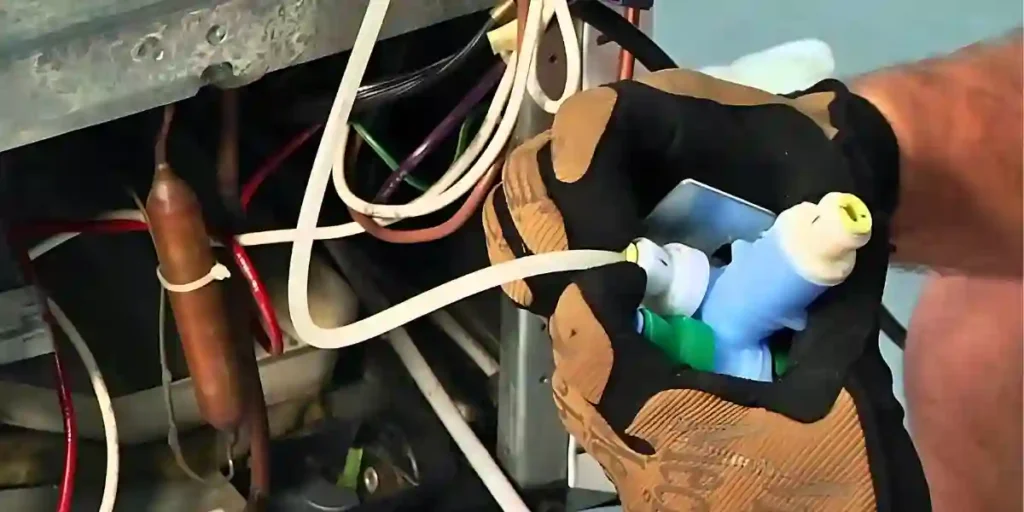
After turning off the water valve, it’s crucial to check for any leaks around the valve area. Inspect the connections carefully to ensure there are no signs of water leakage.
If you notice any leaks, it’s essential to address them promptly. You can tighten the valve using a wrench or call a professional plumber to repair the leak.
Resolving leaks ensures the proper functioning of your water supply system.
Proper Disposal of Accumulated Water in the Line
When you turn off the water valve while the refrigerator is running, some water might accumulate in the water line. To dispose of this water, open the refrigerator door and let it drain out.
It’s important to do this step to prevent any potential water damage or unwanted moisture inside your fridge. Once all the water has drained, you can proceed to the next step.
Reconnecting the Water Line to Your Fridge
Now that you’ve turned off the water valve and disposed of any accumulated water, it’s time to reconnect the water line to your fridge.
Carefully align the water line with the valve’s opening and gently insert it.
Push it in firmly but cautiously to ensure a secure connection. Ensure the water line is properly seated to prevent leaks or disconnections.
Once you’ve reconnected the water line, you can move on to the final steps.
Factors to Consider When Turning Off the Water Valve
Water Valve Accessibility
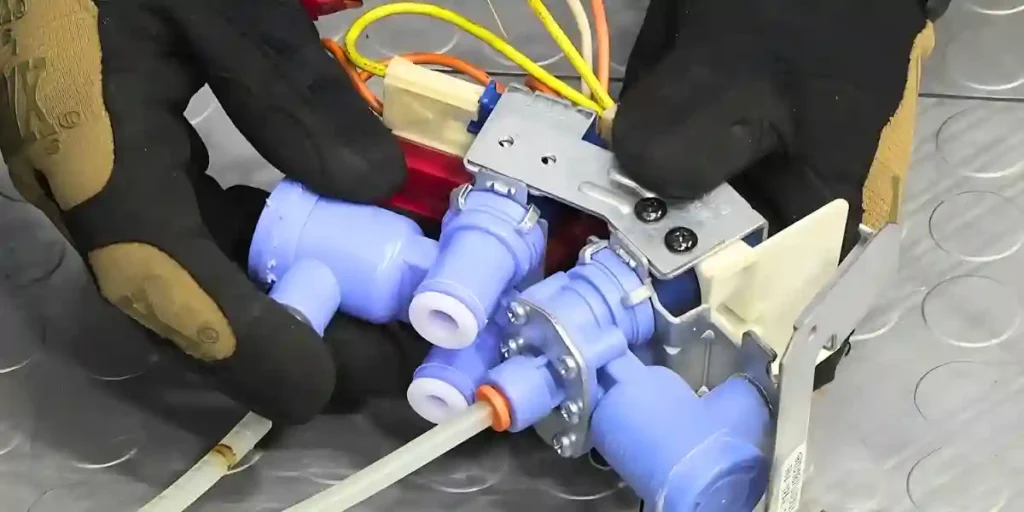
Consider the accessibility of the water valve when turning it off. Ensure there is enough space to reach and operate the valve comfortably. Clear any obstructions or objects that may hinder your access.
Identifying the Correct Valve
Make sure you identify the correct water valve before proceeding. In some cases, there may be multiple valves in the vicinity.
Locate the valve specifically connected to the water supply of your fridge.
Valve Position and Orientation
Take note of the valve’s position and orientation for future reference. Observe if the valve is horizontal or vertical, as this can affect how you turn it off. Understanding its position will make the process easier.
Water Valve Type
Determine the type of water valve you’re dealing with. It could be a gate valve, ball valve, or compression valve. Each type may require a slightly different approach to turning it off.
Valve Turning Direction
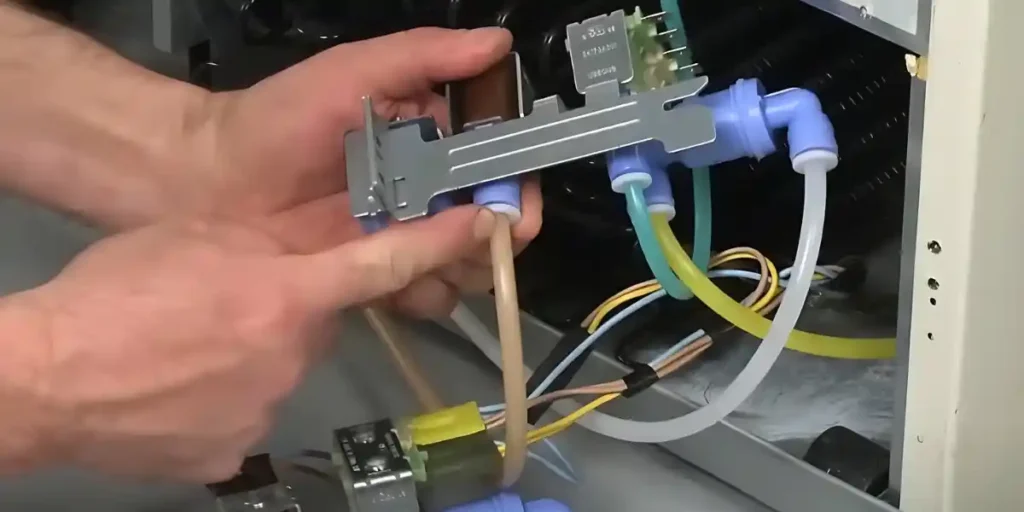
Pay attention to the turning direction required to shut off the water valve. Most valves require clockwise rotation to close.
However, some valves, such as ball valves, may have a lever that needs to be switched perpendicular to the pipe.
Valve Handle Accessibility
Check if the valve handle is easily accessible. It should be within reach and not obstructed by any objects.
Ensure you have a clear line of sight to see the valve’s position and handle orientation.
Preparing Tools, if Needed
Gather any necessary tools before attempting to turn off the water valve.
Depending on the valve type and its condition, you may require pliers, a wrench, or a similar tool for better grip and leverage.
Gradual Valve Closing
Turn the water valve off gradually instead of abruptly. Slowly rotate the valve handle to avoid any sudden pressure changes in the water line, which could potentially cause leaks or pipe damage.
Maintenance Tips for the Water Valve Behind Your Fridge
Regular Inspection
Regularly inspect the water valve behind your fridge to ensure it is in good condition. Look for any signs of corrosion, leaks, or damage.
A visual inspection can help identify potential issues before they become major problems.
Cleaning the Valve
Clean the water valve periodically to remove any debris or sediment buildup. Use a soft brush or cloth to scrub the valve and remove any dirt or grime gently.
This helps maintain smooth operation and prevents clogs or blockages.
Lubrication
Apply a small amount of food-grade silicone lubricant to the valve’s moving parts. This helps reduce friction and ensures smooth turning.
Avoid using petroleum-based lubricants, as they may contaminate the water supply.
Testing the Valve
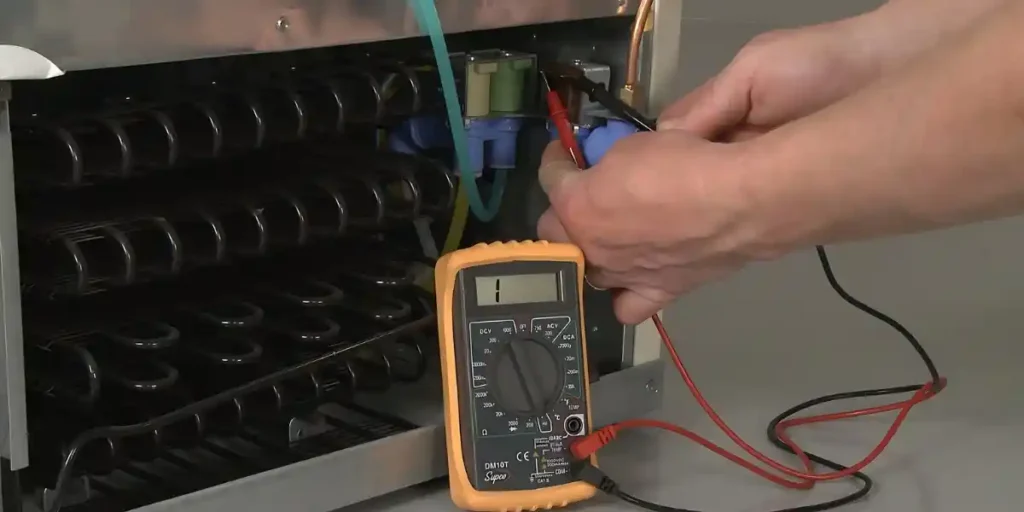
Regularly test the water valve to ensure it is functioning correctly. Turn it off and on a few times to verify that it operates smoothly without any sticking or resistance. This simple test can help identify any potential issues.
Checking for Leaks
Regularly check for leaks around the water valve area. Look for any signs of moisture, water droplets, or water stains.
If you notice any leaks, tighten the valve or seek professional assistance to address the problem promptly.
Insulation
Consider insulating the water valve and pipes behind your fridge. Insulation helps prevent freezing during colder months and minimizes the risk of water damage.
Insulating materials, such as foam pipe sleeves, are readily available at hardware stores.
Mindful Handling
Handle the water valve with care when performing maintenance tasks. Avoid using excessive force when turning the valve on or off.
Gentle and controlled movements prevent damage to the valve and the water line.
FAQs
Can I Turn Off The Water Valve Behind The Fridge Without Professional Help?
Yes, you can turn off the water valve behind the fridge yourself. Just locate the valve and turn it off by rotating the handle clockwise.
How Do I Know If I’ve Successfully Turned Off The Water Valve?
Once you’ve turned off the water valve, check for any water flow or leaks. If there’s no water coming out or visible signs of leakage, you’ve successfully shut off the valve.
Do I Need Any Special Tools To Turn Off The Water Valve?
In most cases, you won’t need any special tools to turn off the water valve behind the fridge. You can usually turn it off using your hand or a wrench if necessary.
Is It Necessary To Turn Off The Water Valve When Moving The Fridge?
It’s generally recommended to turn off the water valve when moving the fridge to prevent any water leaks or accidents. This ensures a smooth and hassle-free moving process.
What Should I Do If The Water Valve Is Difficult To Turn Off?
If the water valve is difficult to turn off, you can use a wrench or pliers for better grip and leverage. Be cautious not to apply too much force to avoid damaging the valve.
How Often Should I Check And Maintain The Water Valve Behind The Fridge?
It’s a good practice to inspect and maintain the water valve periodically, at least once a year. Regular checks and maintenance help ensure its proper functioning and prevent potential issues.
Conclusion
Knowing how to turn off the water valve behind your fridge is important. It helps keep your water supply system safe.
Follow the step-by-step guide and consider factors like accessibility and maintenance tips.
Regular inspection, cleaning, and testing ensure smooth operation. Proper handling prevents leaks and damage.
With some knowledge and care, you can confidently manage your water supply. Keep your water valve in check for a functional and worry-free experience.

